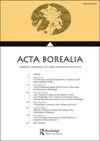“‘Ruottiksi’, translated Paul Muotka patiently. ‘Kiitos.’” Mikael Niemi, Meänkieli and Readers Inside and Outside Tornedalen
IF 0.6
4区 社会学
0 HUMANITIES, MULTIDISCIPLINARY
引用次数: 0
Abstract
Abstract The present study in the research field of literary multilingualism and literary codeswitching is based on Mikael Niemi's novel Mannen som dog som en lax (2006) [The man who died like a salmon]. The novel is set mainly in Tornedalen, a widely bilingual area in Sweden where many people speak both Swedish and Meänkieli, a national minority language in Sweden since 2000. All instances of codeswitching in the material studied were identified and an analysis, based on Eriksson and Haapamäki's model designed to analyse literary multilingualism and literary codeswitching, was performed. The model consists of three main components: (1) the communicative context of the analysed work; (2) the form of codeswitching in the analysed work; and (3) the possible literary functions of codeswitching in the analysed work. The sender, Mikael Niemi, does not consider himself bilingual and most intended receivers are not bilingual either, even though linguistic conditions are central to the theme of the novel. Swedish is the base language of the novel, while elements of Meänkieli/Finnish, varieties of Swedish, and other languages represent a small fraction of the entire text. Implicit literary codeswitching predominates in the material in the form of metalinguistic comments and contextualization cues. By far the most common type of explicit literary codeswitching is between Swedish and Meänkieli/Finnish. The novel contains examples of literary codeswitching used in attempts to reproduce authentic usage and depict an authentic linguistic setting. In other examples, Tornedalen, Tornedalians and Meänkieli/Finnish are depicted as exotic phenomena compared with the majority society. Likewise, there are examples of how certain passages in the novel may include or exclude readers, depending on their understanding of Meänkieli/Finnish. Certain elements of Meänkieli can be interpreted as expressions of linguistic emancipation and the liberation of identity that empowers speakers of Meänkieli and the community of these speakers.Mikael Niemi、Meänkieli和Tornedalen内外的读者
本文以米凯尔·涅米的小说《像鲑鱼一样死去的人》(Mannen som dog som en lax, 2006)为研究对象,对文学多语化和文学语码转换进行了研究。小说主要发生在Tornedalen,这是瑞典一个广泛使用双语的地区,许多人会说瑞典语和Meänkieli,这是瑞典自2000年以来的一种少数民族语言。在所研究的材料中识别出所有代码转换的实例,并根据埃里克森和Haapamäki的模型进行分析,该模型旨在分析文学多语言和文学代码转换。该模型由三个主要部分组成:(1)所分析作品的交际语境;(2)分析作品中代码转换的形式;(3)语码转换在分析作品中可能具有的文学功能。寄件人Mikael Niemi并不认为自己会说两种语言,大多数收件人也不是双语者,尽管语言条件是小说主题的核心。瑞典语是小说的基础语言,而Meänkieli/芬兰语、瑞典语的变体和其他语言的元素只占整个文本的一小部分。隐性文学语码转换以元语言评论和语境化线索的形式在材料中占主导地位。到目前为止,最常见的显性文学代码转换类型是瑞典语和Meänkieli/芬兰语之间的代码转换。这部小说包含了文学代码转换的例子,试图再现真实的用法,描绘真实的语言环境。在其他例子中,与大多数社会相比,托尼达伦人、托尼达伦人和Meänkieli/芬兰人被描绘成异域现象。同样,也有一些例子表明,小说中的某些段落可能包括读者,也可能不包括读者,这取决于他们对Meänkieli/芬兰语的理解。Meänkieli的某些元素可以被解释为语言解放和身份解放的表达,赋予Meänkieli的使用者和这些使用者的社区权力。
本文章由计算机程序翻译,如有差异,请以英文原文为准。
求助全文
约1分钟内获得全文
求助全文

 求助内容:
求助内容: 应助结果提醒方式:
应助结果提醒方式:


